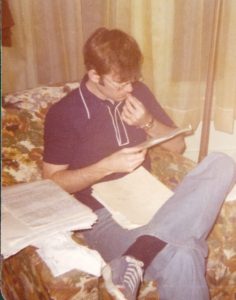The search for the University of Utah’s new Sr. Vice President of Academic Affairs is over. Daniel Reed will say goodbye to the University of Iowa and hello to the Utes as he starts his position on July 1. Reed said he has been preparing for a role like this for as long as he can remember.
As a first-generation college graduate, Reed had always planned to seek higher education.
“You have to understand, my father only finished the fifth grade so [my parents] believed that education was a path to a better life and they really instilled that in me,” Reed said.
University, to Reed, was more than a stepping stone to a better life — it was a way of life.
“I realized early on that being a scholar and being part of creating new knowledge was about the most exciting thing I could imagine doing,” he said. “I always dreamed of being a University professor and I have been blessed to be able to do that.”

After receiving a bachelor’s degree in computer science from the University of Missouri-Rolla, Reed went on to receive a master’s and doctorate degree from Purdue University.
After working as a corporate vice president at Microsoft, founding the Renaissance Computing Institute at the University of North Carolina at Chapel Hill and serving as the director of the National Center for Supercomputing Applications at the University of Illinois, he met current U President Ruth Watkins.
“Dan is an exceptional addition to the university’s leadership team and the thought leadership of our state,” Watkins said in a press release announcing his new position. “He is a talented scholar and administrator and the perfect fit in our efforts to become one of the country’s premier public universities. I look forward to working closely with him in the years ahead.”
Reed was Iowa’s Vice President for Research and Economic Development and is finishing up his roles as professor and University Computational Science and Bioinformatics Chair.
Nationally, Reed chairs the U.S. Department of Energy’s Advanced Scientific Computing Advisory Committee and the steering committee for the National Science Foundation’s Midwest Big Data Hub.
Reed formerly worked on the U.S. President’s Council of Advisors on Science and Technology and the President’s Information Technology Advisory Committee. A previous chair on the board of directors for the Computing Research Association, Reed now serves on its government affairs committee.
“The lesson that I have learned about international policy and collaboration is that to be successful, leaders have to be first and foremost invested in the success of the team, not in themselves,” Reed said. “If they do that, the team will be successful. Then they in turn will be successful. It can’t be about you, it has to be about us.”
Each position has led Reed to his new role at the U, where he sees a positive path ahead.
“There is a real sense of optimism and can-do that the future will be brighter than the past and that people are committed to working together,” Reed said. “I had that sense of excitement across the campus, that the university felt like brighter days were ahead, that new things were happening.”
Reed hopes to continue Watkin’s work not only in improving graduation rates and retention of undergraduates but also to “broaden the base of participation and increase access.”
“I know the challenges that students who don’t have a family who attended college face,” Reed said. “They’re beyond financial — they’re social. Their support structures are all kinds of things and so thinking about all kinds of the senses of diversity and how we empower people to realize their dreams is fundamentally what the university system is about.”
Success for Reed is based on the success of the people he is coming to Utah to serve. In his office sits a plaque that reads, “Live your dreams.”
“That’s the business we’re in as universities, is helping students and faculty realize their dreams and that’s why I’m excited about the possibilities,” Reed said. “I think in a world of change, what universities do has never been more important and that’s why I’m excited about this future.”
@kenzomcd


